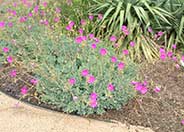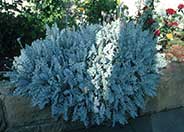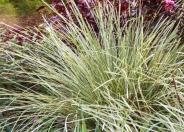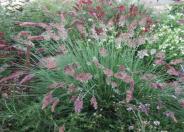
Common name:Delta Fusion Crapemyrtle
Botanical name:Lagerstroemia indica 'Delta Fusion'
Delta Fusion has the perfect combination of dark burgundy foliage and re-blooming hot pink blooms. This small tree or hedge (8-12') is an excellent low water choice. Foliage color does not fade in hot summer sun. Deciduous. Attracts pollinators, summer and fall blooming, heat tolerance, longer blooming, reblooming. Great for an accent, cottage style or informal, hedge, mass planting and privacy planting. Established plants need low water. It does best in full sun with well draining soil. Use slow-growth fertilizer in late winter, before spring growth. Prune to desired shape and size in late winter.

Common name:Rock Purslane
Botanical name:Calandrinia grandiflora
This perennial will grow 12-36" and produces large blue/green rosettes that last for a long season. It produces large, silky, lavender/pink flowers that have lime/green, purple spotted calyces.

Common name:Dusty Miller
Botanical name:Centaurea cineraria
This perennial plant won't grow more than 1' tall and has large, silvery/white leaves with blue, purple, or yellow flowers that bloom in summer.

Common name:Dropmore Catmint
Botanical name:Nepeta X faassenii 'Dropmore'
Dropmore Catmint has soft, grey-green, fragrant foliage that reaches 1'-3' tall, spreading 3'-4' wide. The small leaves are not attractive to cats but bees and butterflies love this plant. This perennial has lavender blue flowers from spring through fall (may depend on heat). Catmint can be planted in sun or part shade in warm inland valleys with well draining, sandy, dry soil. It tolerates coastal conditions. It is drought tolerant once it's established. Prune spent flowers to encourage more blooms. Flowers are fragrant and great for flower arrangements. It is deer and rabbit resistant.

Common name:Platinum Beauty Lomandra
Botanical name:Lomandra 'Platinum Beauty'
This perennial grass reaches about 3' tall and wide. Leaves are glossy green with white variegation, shiny, firm, flat. Each cluster has a sharp, slender, straw-colored bract at its base, which gives it a dense spike-like structure. It does best in full to part sun with well draining soil. Apply fertilizer in spring. No pruning needed for this reliable and tough grass. Established plants are low water usage plants.

Common name:Ruby Grass
Botanical name:Melinis nerviglumis
A small semi-evergreen cool-season grass from S. Africa that forms a tidy 1 foot tall clump. It has blue-green foliage that turns purplish-red in the fall and showy pink flowers that rise a foot above the foliage in the spring and summer with spent flowers still attractive into winter. Best in full sun with regular water in a well-drained soil but tolerates considerable periods without irrigation and near seaside conditions.

Common name:Iceberg Floribunda Rose
Botanical name:Rosa 'Iceberg'
This is a shrub rose (there are climbing varieties) with an abundance of fragrant, medium sized, white blooms. It is one of the most popular roses and very tough.

Common name:Purple Hopseed Bush or Hop Bush
Botanical name:Dodonaea viscosa 'Purpurea'
This fast-growing shrub has an upright, branching habit that reaches a height of 12'-15', with willow-like leaves that are 4" in length. Its foliage is bronzy-green in color, which turns a reddish-purple shade in the fall and winter. It has compact growth and requires full sun for the best results.
Designer: Susan Morrison
Photographer: Vicki Anderson
Practice grass-cycling by leaving short grass clippings on lawns after mowing, so that nutrients and organic matter are returned to the soil.
Replace turf with groundcovers, trees, and shrubs. If you have areas where no one uses the grass, patches that do not grow well, or a turf area too small to water without runoff, consider replacing the turf with water-efficient landscaping.
Develop healthy soil for plants that are vigorous and naturally pest-resistant.